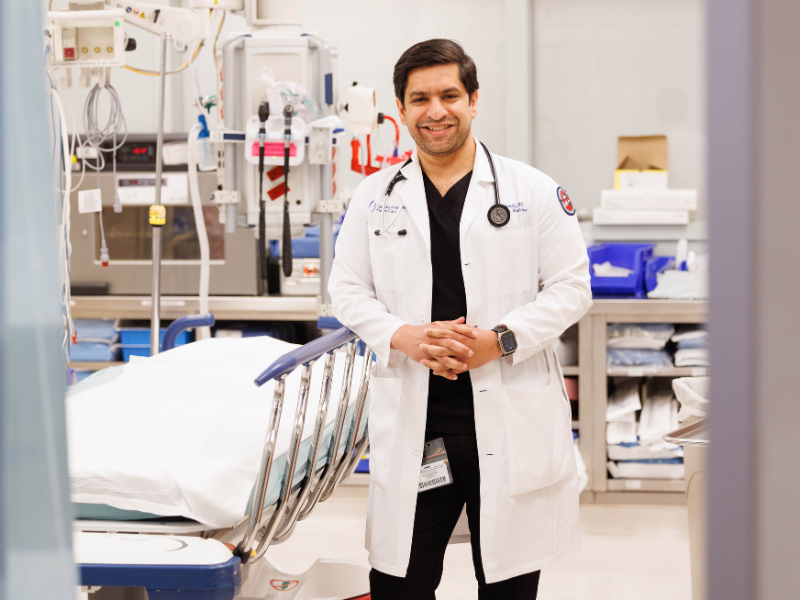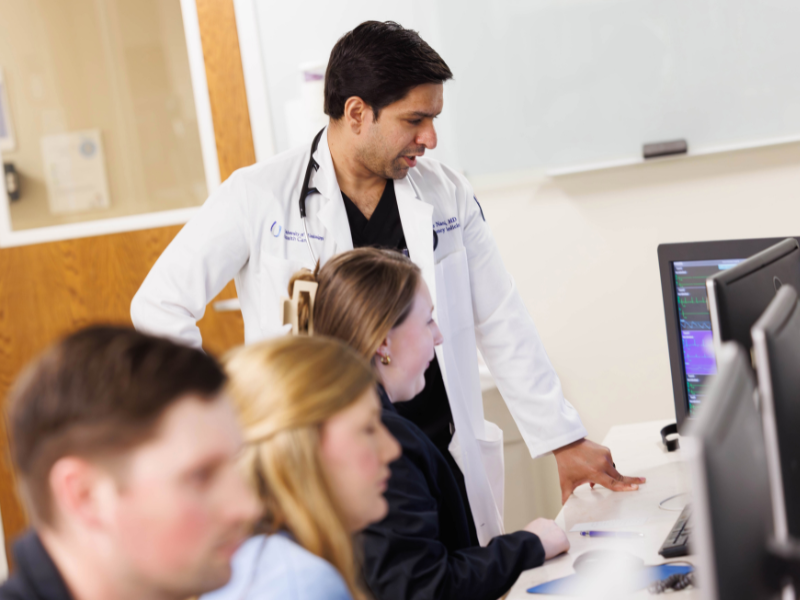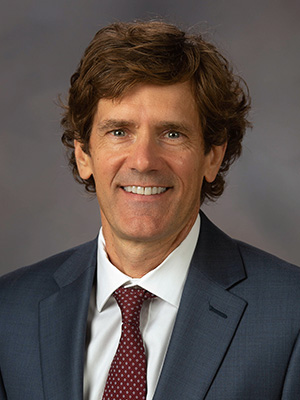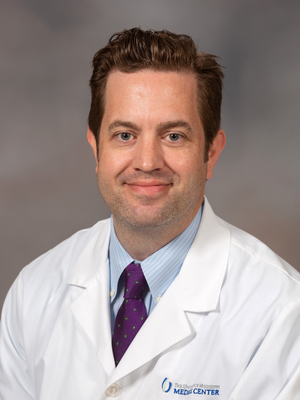#2024UMMCGrad: ER doc masters population health

Becoming an emergency department physician was a natural fit for Dr. Utsav Nandi because it keeps him in tune with the pulse of the community and allows him to see patients who don’t have to worry about affording healthcare.
“Anyone can walk into an ED,” said Nandi, associate professor of emergency medicine. “I love the unpredictability of every shift, the amalgamation of working up complex medical cases and being involved with procedures with my amazing friends who happen to be my colleagues. My specialty requires versatility to adapt to society’s changing needs – whether it be the COVID-19 pandemic, opioid epidemic, firearm injuries or evolving and emerging infectious diseases – which I thrive on.”
He so loves the ER that he wanted to learn how to better serve patients. So he pursued a master’s in population health science from the John Dr. Bower School of Population Health, and graduates in May.

“I wanted to improve health, which is why I went into medical school to be a doctor,” said Nandi, who also earned a master’s in clinical investigation in 2018, two years after completing his emergency medicine residency at the University of Mississippi Medical Center, as chief resident, no less. “Not only did the field of academic population health science not exist in its present formal state when I was studying medicine, I also naively believed that medicine was the only path to improve health.”
ER physicians meet people on the worst day of their lives, he said, and at UMMC, they meet the most vulnerable in the community, who often have nowhere else to go and disproportionately bear the burden of multiple diseases and disabilities.
“Adding insult to moral injury faced by doctors is the realization that even though we may think we know what the right treatment is and can write all sorts of prescriptions and make every referral, once they leave the ED, our patients are back in a place and system where much stronger powers determine and drive their health outcomes.”
Nandi came to UMMC as an emergency medicine resident in 2012 after completing medical school at Weill Cornell Medical College in Qatar. A prolific researcher who has served as principal or co-investigator on more than 35 clinical trials, he is also associate director of research for emergency medicine, associate medical director in the Clinical Research Support Program at the Mississippi Clinical Research and Trials Center and clinical trials track director for the Master of Science in Clinical Investigation Program in the School of Graduate Studies in the Health Sciences.
Dr. Thomas Dobbs, SOPH dean, said Nandi’s clinical expertise complements his commitment to the community’s health.

“The Emergency Room is a window into the struggles of the populations we serve,” said Dobbs. “Dr. Nandi appreciates how his work in the ER can help us understand the health challenges of our patients at a societal level and how to develop upstream interventions that can make a real difference.
“UMMC is a clinical powerhouse, and the marriage of this potency with the principles of population health offers the promise to drive real improvements for the health of our state. Dr. Nandi's work represents the true potential of what a health system can do and how the John D. Bower School of Population Health can play a pivotal role.”
As a SOPH student, Nandi was most surprised by the relatively small role clinical care plays in health outcomes, considering the amount of money pumped into the system, and that social conditions are the primary cause of disease.
“I finally have the vocabulary with which to explain some of my observations as an ED clinician and the research tools to study disparities in our communities,” said Nandi. “After working in sick care for more than a decade as a doctor, I am excited to now work on health.”

Dr. James Galbraith, associate professor and vice chair for research in the Department of Emergency Medicine, said Nandi’s pursuit of the master’s in population health science was a natural extension of his drive to address complex public health disparities and his endless curiosity to learn the approaches to address social determinants of health and disease prevention.
That deeper understanding has equipped him with the added tools and perspectives to tackle the most complex health challenges.
“This year, he is already leading the implementation of a large-scale Emergency Department-based intervention to identify and provide harm reduction interventions for persons with opioid use disorder,” said Galbraith. “His recent training, combined with his prior extensive experience in clinical research and emergency medicine leadership roles, will undoubtedly elevate his contributions to emergency medicine and population health – ultimately benefiting both his academic career and public health outcomes where he practices.”
Nandi said he is excited to now have population health science expertise.
“It is my sincere hope that, now with a school dedicated to population health on campus, at least some core elements of this program will make it to the medical training curriculum so that both future and current physicians have at least a rudimentary understanding of all of the factors that impact health and have a little more humility in their medicalized approach to improving the health of their patients and communities.”


